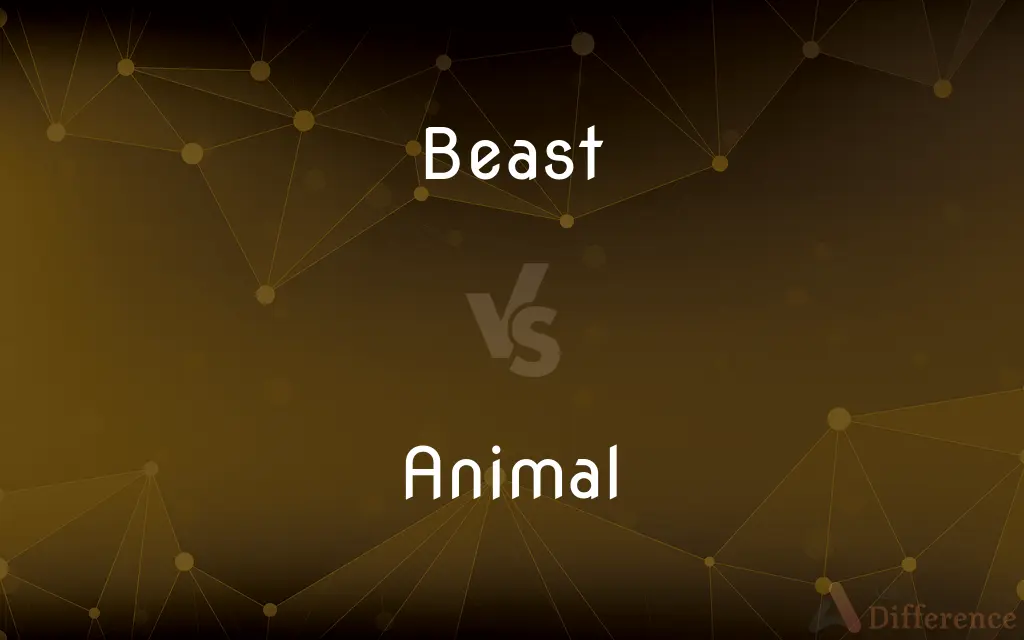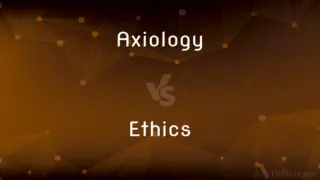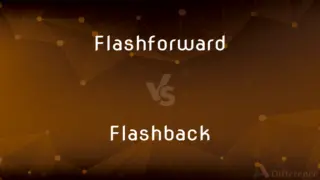Beast vs. Animal — What's the Difference?
By Maham Liaqat & Fiza Rafique — Updated on March 15, 2024
Beast often implies a large, ferocious, or wild creature, while animal refers to any member of the kingdom Animalia, encompassing a vast range of living organisms.

Difference Between Beast and Animal
Table of Contents
ADVERTISEMENT
Key Differences
Beast typically connotes a creature of considerable size, strength, or ferocity, often used to describe wild animals that inspire fear or awe in humans. This term can evoke images of mythical creatures or dangerous wildlife, highlighting aspects of power and wildness. In contrast, the term animal is more neutral and scientific, covering all members of the Animalia kingdom, from the smallest insects to the largest mammals, without implying any specific traits related to size, behavior, or disposition.
The usage of "beast" can also carry symbolic or metaphorical weight, frequently appearing in literature, folklore, and religious texts to embody human fears, vices, or challenges to overcome. It can represent untamed nature, primal instincts, or challenges to human morality and society. On the other hand, "animal" is used in a wide range of contexts, from scientific discussion about biological classification and behavior to everyday conversations about pets, wildlife, and human interactions with the natural world.
In some contexts, "beast" can be used affectionately or humorously to refer to animals that are neither large nor ferocious, such as when a pet owner refers to their small dog as "my little beast." This usage showcases the term's flexibility in conveying affection, familiarity, or irony. Conversely, "animal" is the go-to term in academic and professional fields related to biology, zoology, and conservation, where precision and neutrality are crucial.
The distinction between these terms highlights human perspectives on the animal kingdom. "Beast" reflects historical and cultural attitudes toward certain animals, often those that posed a threat or were not well understood. These perspectives have evolved over time, influenced by changes in society, science, and our relationship with the natural world. In contrast, "animal" represents a more detached and scientific view, emphasizing the diversity and complexity of life forms without imparting moral or emotional judgment.
Understanding the difference between "beast" and "animal" is essential in various fields, including literature, biology, and psychology. It helps in accurately conveying ideas about nature, wildlife, and human interactions with other living beings. While "beast" captures the imagination and evokes emotional responses, "animal" encourages a broader, more inclusive view of the natural world and our place within it.
ADVERTISEMENT
Comparison Chart
Definition
Often large, ferocious, wild creature
Any member of the kingdom Animalia
Connotation
Power, ferocity, wildness
Neutrality, scientific classification
Usage
Symbolic, metaphorical, emotional
Scientific, neutral, everyday
Examples
Mythical creatures, dangerous wildlife
Insects, birds, mammals, reptiles
Human Perspective
Reflects fear, awe, challenges
Emphasizes diversity, biological study
Compare with Definitions
Beast
Large or ferocious creature.
The bear, a mighty beast, roamed the forest.
Animal
Subject of biological study.
Scientists study animal behavior to understand ecological relationships.
Beast
Affectionate or humorous term.
Her cat, despite its small size, was affectionately called the household beast.
Animal
Diverse in form and habitat.
The diversity of animal life in the rainforest is staggering.
Beast
Untamed or primal nature.
The story explored the beast within humans, unleashed in extreme conditions.
Animal
Member of Animalia kingdom.
From microscopic insects to giant whales, every animal plays a role in the ecosystem.
Beast
Symbol of fear or challenge.
In many cultures, dragons are beasts symbolizing power and chaos.
Animal
Neutral term for living organisms.
Animal rights activists advocate for the welfare of all animals, big and small.
Beast
Mythical or legendary creature.
Tales of the Loch Ness Monster speak of a beast lurking in the deep.
Animal
Refers to non-human creatures.
Domestic animals, like dogs and cats, have evolved alongside humans for thousands of years.
Beast
An animal, especially a large or dangerous four-footed one
A wild beast
Animal
A living organism that feeds on organic matter, typically having specialized sense organs and nervous system and able to respond rapidly to stimuli
Wild animals adapt badly to a caged life
Humans are the only animals who weep
Beast
An animal other than a human, especially a large four-footed mammal.
Animal
Relating to or characteristic of animals
Animal welfare
The evolution of animal life
Beast
Animal nature as opposed to intellect or spirit
An insult that brought out the beast in him.
Animal
Relating to or denoting the pole or extremity of an embryo that contains the more active cytoplasm in the early stages of development.
Beast
A very large or powerful person or thing
Drives a beast of a truck.
Animal
Any of numerous multicellular eukaryotic organisms of the kingdom Metazoa (or Animalia) that ingest food rather than manufacturing it themselves and are usually able to move about during at least part of their life cycle. Sponges, jellyfishes, flatworms, mollusks, arthropods, and vertebrates are animals.
Beast
Something of a specified kind
Her latest film is an odd beast.
Animal
An animal organism other than a human, especially a mammal.
Beast
A brutal, contemptible person.
Animal
A person who behaves in a bestial or brutish manner.
Beast
Any animal other than a human; usually only applied to land vertebrates, especially large or dangerous four-footed ones.
Animal
A human considered with respect to their physical nature, as opposed to rational or spiritual nature.
Beast
A domestic animal, especially a bovine farm animal.
Animal
A person having a specified aptitude or set of interests
“that rarest of musical animals, an instrumentalist who is as comfortable on a podium with a stick as he is playing his instrument” (Lon Tuck).
Beast
A monstrously unusual and dangerous animal.
Animal
Relating to, characteristic of, or derived from an animal or animals, especially when not human
Animal cells.
Animal welfare.
Beast
A person who behaves in a violent, antisocial or uncivilized manner.
Animal
Relating to the physical as distinct from the rational or spiritual nature of people
Animal instincts and desires.
Beast
(slang) Anything regarded as larger or more powerful than one of its normal size or strength.
That is a beast of a stadium.
The subwoofer that comes with this set of speakers is a beast.
Animal
(science) A eukaryote of the clade Animalia; a multicellular organism that is usually mobile, whose cells are not encased in a rigid cell wall (distinguishing it from plants and fungi) and which derives energy solely from the consumption of other organisms (distinguishing it from plants).
A cat is an animal, not a plant. Humans are also animals, under the scientific definition, as we are not plants.
Beast
(slang) Someone who is particularly impressive, especially athletically or physically.
Animal
(loosely) Any member of the kingdom Animalia other than a human.
Beast
(figuratively) Something unpleasant and difficult.
Animal
Any land-living vertebrate (i.e. not fishes, insects, etc.).
Beast
A thing or matter, especially a difficult or unruly one.
Animal
(figuratively) A person who behaves wildly; a bestial, brutal, brutish, cruel, or inhuman person.
My students are animals.
Beast
To impose arduous exercises, either as training or as punishment.
Animal
(informal) A person of a particular type.
He's a political animal.
Beast
Great; excellent; powerful
Animal
, thing.
A whole different animal
Beast
Any living creature; an animal; - including man, insects, etc.
Animal
Of or relating to animals.
Animal instincts
Beast
Any four-footed animal, that may be used for labor, food, or sport; as, a beast of burden.
A righteous man regardeth the life of his beast.
Animal
Raw, base, unhindered by social codes.
Animal passions
Beast
Any animal other than a human; - opposed to man.
'Tain't a fit night out for man nor beast.
Animal
Pertaining to the spirit or soul; relating to sensation or innervation.
Beast
Fig.: A coarse, brutal, filthy, or degraded fellow.
Animal
Excellent
Beast
A game at cards similar to loo.
Animal
An organized living being endowed with sensation and the power of voluntary motion, and also characterized by taking its food into an internal cavity or stomach for digestion; by giving carbonic acid to the air and taking oxygen in the process of respiration; and by increasing in motive power or active aggressive force with progress to maturity.
Beast
A penalty at beast, omber, etc. Hence: To be beasted, to be beaten at beast, omber, etc.
Animal
One of the lower animals; a brute or beast, as distinguished from man; as, men and animals.
Beast
A living organism characterized by voluntary movement
Animal
Of or relating to animals; as, animal functions.
Beast
A cruelly rapacious person
Animal
Pertaining to the merely sentient part of a creature, as distinguished from the intellectual, rational, or spiritual part; as, the animal passions or appetites.
Animal
Consisting of the flesh of animals; as, animal food.
Animal
A living organism characterized by voluntary movement
Animal
Of the appetites and passions of the body;
Animal instincts
Carnal knowledge
Fleshly desire
A sensual delight in eating
Music is the only sensual pleasure without vice
Animal
Of the nature of or characteristic of or derived from an animal or animals;
The animal kingdom
Animal instincts
Animal fats
Decaying vegetable matter
Common Curiosities
What is the significance of studying animals?
Studying animals helps us understand biological diversity, ecological relationships, evolutionary processes, and our own impact on the natural world.
How does culture influence the perception of certain animals as beasts?
Cultural stories, myths, and experiences shape how animals are viewed, often turning those feared or respected into beasts imbued with symbolic meanings.
Why is it important to differentiate between "beast" and "animal"?
Differentiating these terms allows for clearer communication, whether in conveying scientific information, exploring literary themes, or discussing human-animal relationships.
How has the concept of the beast evolved over time?
The concept of the beast has evolved with human societies, reflecting changing attitudes towards nature, spirituality, and the unknown.
What role do animals play in ecosystems?
Animals play crucial roles in ecosystems, including pollination, seed dispersal, controlling pest populations, and serving as food sources in the food chain.
What impact do humans have on animals and their habitats?
Humans impact animals and their habitats through activities like deforestation, pollution, climate change, and urbanization, threatening biodiversity and ecological balance.
What defines a beast in literature or mythology?
In literature or mythology, a beast often embodies primal instincts, challenges to overcome, or moral lessons, representing more than just a physical creature.
Can the term "beast" apply to non-threatening animals?
Yes, "beast" can be used affectionately or humorously for any animal, regardless of its size or nature, reflecting the term's flexibility in different contexts.
Can the term "animal" include human beings?
Scientifically, humans are classified as animals within the kingdom Animalia, though in everyday language, "animal" usually refers to non-human creatures.
Why do some animals become symbolic beasts in cultures?
Animals that evoke fear, admiration, or mystery can become symbolic beasts in cultures, representing deeper themes of struggle, power, or transformation.
Share Your Discovery

Previous Comparison
Axiology vs. Ethics
Next Comparison
Flashforward vs. FlashbackAuthor Spotlight
Written by
Maham LiaqatCo-written by
Fiza RafiqueFiza Rafique is a skilled content writer at AskDifference.com, where she meticulously refines and enhances written pieces. Drawing from her vast editorial expertise, Fiza ensures clarity, accuracy, and precision in every article. Passionate about language, she continually seeks to elevate the quality of content for readers worldwide.













































